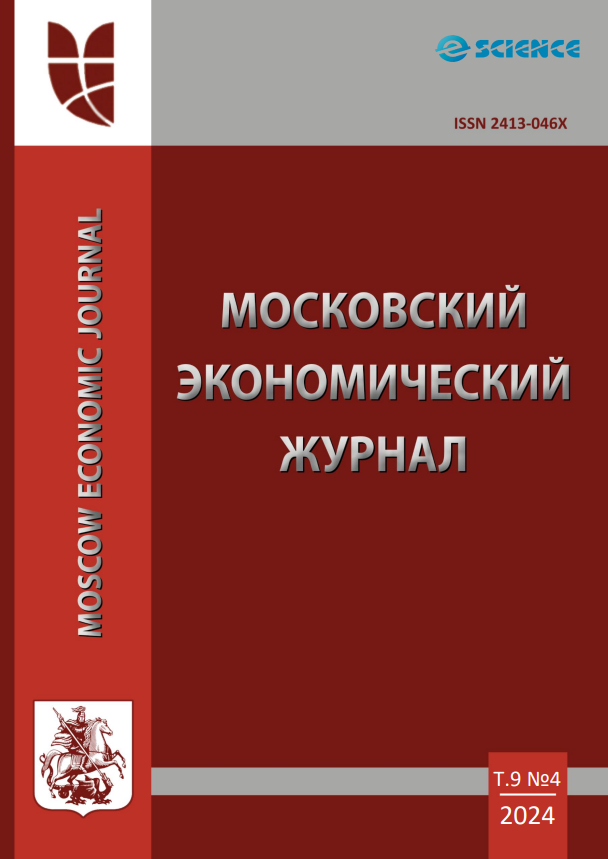Северо-Восточный сельскохозяйственный университет (Международный институт, старший преподаватель)
УДК 33 Экономика. Народное хозяйство. Экономические науки
Предпринимательская ориентация (entrepreneurial orientation — EO) является ключевой темой в области исследований предпринимательства и оказывает значительное влияние на развитие и успех предприятий. В данной статье используется метод анализа текстов для всестороннего обзора и рассмотрения высокоуровневых исследовательских работ в области EO, охватывая такие аспекты, как концепция EO, создание шкалы и эмпирические исследования. Мы обнаружили, что в академических кругах существует дискуссия относительно определения концепции EO и ее компонентов, создания и выбора шкалы, механизма взаимосвязи EO с эффективностью предприятий и модерирующих факторов, и не было достигнуто всеобщего консенсуса. Это также предоставляет широкую сферу для будущих теоретических и эмпирических исследований EO. Будущие исследования должны сосредоточиться на достижении теоретической консистентности, реализации доминирующего академического дискурса. Нами также предполагается возможность рекомендаций альтернативных инструментов измерения и улучшенных методов анализа для расширения области и глубины эмпирических исследований, обогащения теории EO и ее применения в различных областях, включая экономику и общество.
предпринимательская ориентация; анализ текстов; концепция; шкала; эффективностью компании
1. Широкова, Г.В. Предпринимательская ориентация: истоки концепции и основные подходы к исследованию. Российский журнал менеджмента. 2012. Том 10. № 1. С. 55-72.
2. Kraus, S.; Filser, M.; Stöckmann, C.; Covin, J.G. The status quo of research on entrepreneurial orientation: Conversational landmarks and theoretical scaffolding // Journal of Business Research. 2021. Vol. 128. P.: 564-577.
3. Miller, D. The correlates of entrepreneurship in three types of firms // Management Science. 1983. Vol. 29(7). P.: 770-791.
4. Wales, W.J.; Covin, J.G. The status quo of research on enterpreneurial orientation: Conversational landmarks and theoretical scaffolding // Journal of Business Research. 2021. Vol. 128. P.: 564-577.
5. Lumpkin, G.T.; Dess, G.G. Clarifying the entrepreneurial orientation construct and linking it to performance // Academy of Management Review. 1996. Vol. 21(1). P.: 135-172.
6. Covin, J.G.; Slevin, D.P. The influence of organization structure on the utility of an entrepreneurial top management style // Journal of Management Studies. 1988. Vol. 25(3). P. 217-234.
7. Covin, J.G.; Slevin, D.P. Strategic management of small firms in hostile and benign environments // Strategic Management Journal. 1989. Vol. 10(1). P.: 75-87.
8. Naman, J.L.; Slevin, D.P. Entrepreneurship and the concept of fit: A model and empirical tests // Strategic Management Journal. 1993. Vol. 14(2). P.: 137-153.
9. Covin, J.G.; Slevin, D.P.; Schultz, R.L. Implementing strategic missions: Effective strategic structural and tactical choices // Journal of Management Studies. 1994. Vol. 31(4). P.: 481-505.
10. Wiklund, J. The sustainability of the entrepreneurial orientation-performance relationship // Entrepreneurship Theory and Practice. 1999. Vol. 24(1). P.: 37-48.
11. Covin, J.G.; Wales, W.J. The measurement of entrepreneurial orientation // Entrepreneurship Theory and Practice. 2012. Vol. 36(4). P.: 677-702.
12. Kreiser, P.M.; Marino, L.D.; Weaver, K.M. Assessing the psychometric properties of the entrepreneurial orientation scale: A multi-country analysis // Entrepreneurship Theory and Practice. 2002. Vol. 26(4). P.: 71-94.
13. Zahra, S.A. Predictors and financial outcomes of corporate entrepreneurship: An exploratory study // Journal of Business Venturing. 1991. Vol. 6(4). P.: 259-285.
14. Zahra, S.A.; Covin, J.G. Contextual influences on the corporate entrepreneurship-performance relationship: A longitudinal analysis // Journal of Business Venturing. 1995. Vol. 10(1). P.: 43-58.
15. Zahra, S.A.; Nielsen, A.P.; Bogner, W.C. Corporate entrepreneurship, knowledge, and competence development // Entrepreneurship Theory and Practice. 1999. Vol. 23(3). P.: 169-189.
16. Fredrickson, J.W. Transferring core manufacturing technologies in high-technology firms // California Management Review. 1996. Vol. 38(4). P.: 50-76.
17. Jambulingam, T.; Kathuria, R.; Doucette, W.R. Entrepreneurial orientation as a basis for classification within a service industry: The case of retail pharmacy industry // Journal of Operations Management. 2005. Vol. 23(1). P.: 23-42.
18. Basso, O.; et al. A critical examination of the relationship between entrepreneurial orientation and environmental sustainability // Small Business Economics. 2009. Vol. 33(4). P.: 303-318.
19. George, B.A. Entrepreneurial orientation: A theoretical and empirical examination of the consequences of differing construct representations // Journal of Management Studies. 2011. Vol. 48(6). P.: 1291-1313.
20. Morris, M.H.; Coombes, S.; Schindehutte, M. Antecedents and outcomes of entrepreneurial orientation: A theoretical extension // Journal of Business Research. 2007. Vol. 60(12). P. 1255-1265.
21. Covin, J.G.; Lumpkin, G.T. Entrepreneurial orientation theory and research: Reflections on a needed construct // Entrepreneurship Theory and Practice. 2011. Vol. 35(5). P.: 855-872.
22. Covin, J.G.; Miles, M.P. Corporate entrepreneurship and the pursuit of competitive advantage // Entrepreneurship Theory and Practice. 1999. Vol. 23(3). P.: 47-63.
23. Ginsberg, A. Measuring changes in entrepreneurial orientation following industry deregulation: The development of a diagnostic instrument // Proceedings of the International Council for Small Business / ed. by B.G. Roberts. Marietta, GA: U.S. Affiliate of the International Council for Small Business, 1985. P.: 50-57.
24. Walter, A.; Auer, M.; Ritter, T. The impact of network capabilities and entrepreneurial orientation on university spin-off performance // Journal of Business Venturing. 2006. Vol. 21(4). P.: 541-567.
25. Chang, S.C.; Lin, R.J.; Chang, F. J., Chen, R.H. Achieving manufacturing flexibility through entrepreneurial orientation // Industrial Management & Data Systems. 2007. Vol. 107(7). P.: 997-1017.
26. Hughes, M.; Morgan, R.E. Deconstructing the relationship between entrepreneurial orientation and business performance at the embryonic stage of firm growth // Industrial Marketing Management. 2007. Vol. 36(5). P.: 651-661.
27. Chadwick, K.; Barnett, T.; Dwyer, S. An empirical analysis of the entrepreneurial orientation scale // The Journal of Applied Management and Entrepreneurship. 2008. Vol. 13(4). P.: 64-85.
28. Hansen, J.D.; Deitz, G.D.; Tokman, M.; Marino, L.D.; Weaver, K.M. Cross-national invariance of the entrepreneurial orientation scale // Journal of Business Venturing. 2009. Vol. 5(3). P.: 1-18.
29. Li, Y.H.; Huang, J.W.; Tsai, M.T. Entrepreneurial orientation and firm performance: The role of knowledge creation process // Industrial Marketing Management. 2009. Vol. 38(4). P.: 440-449.
30. Lee, Y.; Zhuang, Y.; Joo, M.; Bae, T.J. Revisiting Covin and Slevin (1989): Replication and extension of the relationship between entrepreneurial orientation and firm performance // Journal of Business Venturing Insights. 2019. Vol. 12. – Art. no.: e00144.
31. Zhang, H.Y. Reviewing the development of entrepreneurial orientation scale // Research and Development Management. 2011. Vol. 2. P.: 41-47.
32. Edwards, J.R. The fallacy of formative measurement // Organizational Research Methods. 2011. Vol. 14(2). P.: 370-388.
33. Le Breton-Miller, I.; Miller, D. Entrepreneurial orientation: A theoretical and empirical examination of the consequences of differing construct representations // Journal of Management Studies. 2011. Vol. 48(6). P.: 1291-1313.
34. Short, J.C.; Broberg, J.C.; Cogliser, C.C.; Brigham, K.H. Construct validation using computer-aided text analysis (CATA): An illustration using entrepreneurial orientation // Organizational Research Methods. 2009. Vol. 12(2). P.: 320-347.
35. Bhattacharya, A.; Misra, S.; Sardashti, H. Strategic orientation and firm risk // International Journal of Research in Marketing. 2019. Vol. 36(4). P.: 509-527.
36. Dess, G.G.; Lumpkin, G.T. The role of entrepreneurial orientation in stimulating effective corporate entrepreneurship // Academy of Management Executive. 2005. Vol. 19(1). P.: 147-156.
37. Wang, C.L. Entrepreneurial orientation, learning orientation, and firm performance // Entrepreneurship Theory and Practice. 2008. Vol. 32(4). P.: 635-657.
38. Rauch, A.; Wiklund, J.; Lumpkin, G.T.; Frese, M. Entrepreneurial orientation and business performance: An assessment of past research and suggestions for the future // Entrepreneurship Theory and Practice. 2009. Vol. 33(3). P.: 761-787.
39. Wales, W.J.; Gupta, V.K.; Mousa, F.T. Empirical research on entrepreneurial orientation: An assessment and suggestions for future research // International Small Business Journal. 2013. Vol. 31(4). P.: 357-383.
40. Lumpkin, G.T.; Dess, G.G. Linking two dimensions of entrepreneurial orientation to firm performance: The moderating role of environment and industry life cycle //Journal of Business Venturing. 2001. Vol. 16(5). P.: 429-451.
41. Wiklund, J.; Shepherd, D. Entrepreneurial orientation and small business performance: A configurational approach // Journal of Business Venturing. 2005. Vol. 20(1). P.: 71-91.
42. Hu, W.B.; Zhang, Y.L. Transforming new enterprise entrepreneurial orientation into performance of new enterprise capabilities: Theoretical model and empirical research in China // Nankai Management Review. 2011. Vol. 1. P.: 83-95.
43. Широкова, Г.В.; Богатырева, К.А. Взаимосвязь предпринимательской ориентации и результатов деятельности фирмы: результаты исследования российских фирм малого и среднего бизнеса // Вестник Санкт-Петербургского университета. Сер. Менеджмент. 2014. № 1. С. 3-27.
44. Богатырева, К.А.; Широкова, Г.В. Предпринимательская ориентация: этапы становление концепции и основные направления исследований // Российский журнал менеджмента. 2015. № 3(1). С. 65-90.
45. Bogatyreva, K.; Beliaeva, T.; Shirokova, G.; Puffer, S.M. Entrepreneurial orientation, SME growth, and the role of the business environment: A study on Russian and Finnish SMEs // Journal of East-West Business. 2017. Vol. 23(3). P.: 189-221.











